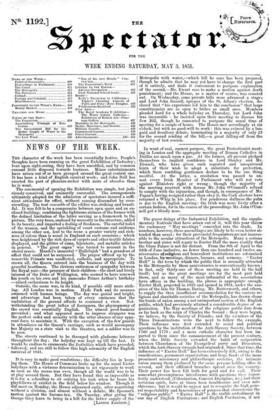NEWS OF THE WEEK.
THE character of the week has been essentially festive. People's thoughts have been running on the great Exhibition of Industry; bent upon sight-seeing, they have been unsettled, and by common consent little disposed towards business. Minor entertainments have arisen out of or been grouped around the great central one. It has been a kind of English carnival week ; and John Bull has enacted the part of pleasure-seeker with more of abandon than he is wont.
The ceremonial of opening the Exhibition was simple, but judi- oiously conceived, and eminently successful. The arrangements ultimately adopted for the admission of spectators insured a suffi- cient attendance for effect, without causing discomfort by over- crowding. The tout ensemble of the edifice was striking and beauti- ful. It was felt to be a compromise between open space and an en- closed building; combining the lightsome airiness of the former with the defined limitation of the latter serving as a framework to the picture.. The very trees enclosed by necessity in the structure, added to its beauty, and imparted a feeling of freshness. The careful toilet of the women and the sprinkling of court costume and uniforms among the other sex, lent to the scene a greater variety and rich- ness of colour than is usual in England on such occasions ; which was heightened by the rich dyes of carpets and other textile fabrics displayed, and the glitter of arms, bijouterie and metallic articles in general. "The great organ" was turned to account in the choral music. Handel's immortal "Hallelujah" had a grandeur of effect that could not be surpassed. The prayer -offered up by the venerable Primate was unaffected, catholic, and appropriate. To crown all, the Queen entered into the business of the day with graceful heartiness. The obvious entireness of sympathy between the Royal pair—the presence of their children—the alert and lively interest of the Duke of Wellington, who seemed to have renewed his youth on his own and his namesake Prince Arthur's birthday —raised enthusiasm to its height.
Outside, the scene was, in its kind, if possible still more strik- ing. All London was in motion. Hyde Park and its accesses swarmed with human beings. The day was genial and bright, and advantage had been taken of every eminence that the undulation of the ground affords to command a view. Not- withstanding the great influx of foreigners, the physiognomy of the crowd was essentially English. The utmost good-humour prevailed ; and what appeared most to impress strangers was the perfect order and security with the utter absence of any appa- rent force to maintain it. With the exception, of the few guards in attendance on the Queen's carriage, such as would accompany her Majesty on a state visit to the theatres, not a soldier was to be seen.
The streets continued to be thronged with gladsome loiterers throughout the day ; the holyday was kept up till the last. It would be endless to enumerate the festivities which have preceded, - followed; and are still to follow this high solemnity of the English carnival of 1851.


























